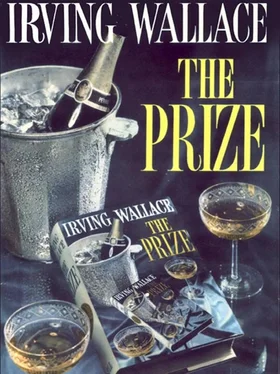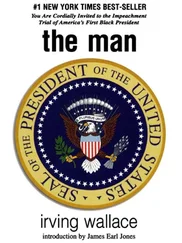‘Again, as I have said, Dr. Wirsén’s was the decisive veto. Ibsen’s name was offered in 1903. Wirsén argued that to honour Ibsen then was, in effect, to honour a dead monument. Wirsén seemed to be saying that Ibsen’s best plays had been done between Peer Gynt in 1867 and The Master Builder in 1892, and that in the eleven years after, his talent had declined. On the other hand, one of Ibsen’s fellow Norwegians, Björnstjerne Björnson, a writer Nobel himself had admired, was still at the height of his powers. The argument carried the day. Ibsen was voted down and Björnson elected.’ Jacobsson paused, lost in thought a moment, and then resumed. ‘The opposition to August Strindberg was unfortunate, but even more bitter. Wirsén judged Strindberg’s plays as “old-fashioned”. That may have decided the matter. On the other hand, I sometimes think Strindberg was his own worst enemy. Wirsén and the majority of the Academy, and the King of Sweden, too, were appalled by the dramatist’s private life. Strindberg had been thrown out of school for low grades. He had been fired from every job he had undertaken. He had been married and divorced three times. He had been sentenced to jail for blasphemy. He was a drunkard, an anti-Semite, and an advocate of black magic. And if there was ever any hope for him, he destroyed it by ridiculing the Swedish Academy in print. I believe it was in Aftontidningen that he wrote, “The anti-Nobel Prize is the only one I would accept!” No men enjoy honouring someone who persistently insults them, and so Wirsén and the Academy had little difficulty in keeping the prize from Strindberg. Of course, for accuracy, I must add that Wirsén did not always have his way. There was an awful fight in 1908. Wirsén and the board were behind Algernon Swinburne, and half the Academy was behind Selma Lagerlöf. A deadlock resulted, and a poor co mpromise candidate, Rudolf Eucken, a German, was elected laureate. After a year of politicking, however, the Lagerlöf adherents managed to acquire a majority vote, and in 1909, over Wirsén’s opposition, they gave her the prize. With that defeat, I believe, Wirsén lost his power over his colleagues.’
‘The Strindberg veto still fascinates me,’ said Craig. ‘Have many authors been deprived of the prize because of their personal lives?’ Shortly before, Craig’s mind had gone back over his last three years, his alcoholic bouts, and he had wondered if the Academy would have elected him had they known the truth. Now, he was curious.
‘Unfortunately, a writer’s behaviour is often an issue,’ confessed Jacobsson, ‘but, aside from Strindberg and D’Annunzio, I cannot think of a single case where it has been the determining factor. Although, now that you bring it up, I do recall one laureate who was almost passed over because of his private life. If the ladies will forgive me, I must mention the example of André Gide. Year after year, he was a contender, and year after year, he was voted down because of his homosexuality, which he had admitted and defended in public. In 1947, Gide’s name came up again. By this time, many members of the Academy had become more tolerant of him. His perversion was still an issue, but there was an odd switch in the balloting. One of Gide’s most ardent supporters suddenly became prudish and turned against him, while at the same time, several members of the conservative bloc suddenly favoured him. As you know, he was finally elected and, because he was ailing, had the French Ambassador to Sweden pick up his prize.’
‘You’ve been speaking of personal behaviour,’ said Emily. ‘What about personal beliefs? Do the ideas an author stands for ever affect the voting?’
‘Definitely,’ said Jacobsson. ‘In 1916, the Academy board recommended Zenito Pérez Galdos, a Spaniard. But a majority of the actual Academy was impressed by Romain Rolland’s pacifism, his unpopular stand against World War I, which caused his self-imposed exile, and his leaving belligerent France for neutral Sweden. As a result, Rolland won the prize. In 1928, Archbishop Nathan Söderblom, although not exactly a literary figure, was a member of the Swedish Academy. He was an ecclesiastic of considerable prestige-a few years later, he would win the Peace Prize-and when he backed Henri Bergson for the literary award, because he venerated the Frenchman’s philosophic beliefs, all opposition to Bergson fell aside. However, Miss Stratman, sometimes an author’s beliefs will act against him. In 1934, Benedetto Croce, of Italy, was the favourite to win. It was a time, in Italy, when Benito Mussolini and his Fascist blackshirts were on the rise. Croce was anti-Fascist and outspoken in his hatred of Mussolini. A Nobel award to Croce would have been a slap in the face to Mussolini, and the Italian dictator knew it. I cannot substantiate what happened next-some say that Mussolini got in touch with his Ambassador in Sweden, and the Ambassador got in touch with the Swedish Academy-but, at any rate, Croce was voted down for his beliefs, and his relatively harmless countryman, Luigi Pirandello, was given the prize. I know that this sounds weak-kneed, but you must remember it in the context of the time, a time when Fascism was a fearful threat. Anyway, I believe our Academy members made up for it in 1958, when they courageously gave Boris Pasternak the prize for his beliefs, despite the Communists holding a gun to our heads.’
‘But you can be pressured and bullied?’ said Stratman.
Jacobsson lifted his palms upward and shrugged. ‘I have told you, Herr Professor, we are only men. More often than not, the pressures are lesser ones, and they come not from without but from within this room. There is always what you Americans call lobbying.’
Jacobsson paused. He had something on the tip of his tongue, and hesitated, as if to reconsider it, but then spoke again. ‘There is one notorious case-an American author-I do not think I should mention the name. This author had produced several novels that, for reasons of personal taste, had impressed two senior members of the Academy, Dr. Sven Hedin, the explorer, and Selma Lagerlöf. These two tried to convince their colleagues that the American must have the prize. The majority of the Academy considered the works of this American potboilers and, as the chairman put it, “mediocre”. Nevertheless, Hedin and Lagerlöf persisted, dramatizing the polemic value of the American’s books, and finally invoking their seniority as judges until the Academy capitulated. The American won the prize, although originally opposed by the majority of members.’
‘I wonder who it was,’ said Leah.
Jacobsson waved his finger. ‘Not important. The American was certainly as deserving as many laureates before or since.’ Jacobsson looked across the table at Stratman. ‘Have you had enough of our little bouts in this sacred room, or do you have an appetite for more?’
‘The entrée was excellent,’ said Stratman with a smile. ‘I still have room for a dessert.’
‘Very well,’ Jacobsson thought a moment, reliving his precious Notes in his mind, reviewing this story and then that, censoring some and considering others, and when he was ready, he leaned his elbows on the table, and resumed. ‘In 1921, the two leading candidates were John Galsworthy and Anatole France. The board recommended Galsworthy, considering France’s output as “a dainty hothouse”, but the majority of the Academy favoured France for injecting a new romanticism into literature. Anatole France was elected. It was eleven years before Galsworthy was offered as a serious candidate again. This time, his opponents were Paul Ernst, the German poet, and H. G. Wells. The argument for Ernst was that he was not only gifted and uncommercial in his creativity, but that he needed the money more than Galsworthy. Nevertheless, the final vote was in Galsworthy’s favour.
Читать дальше












